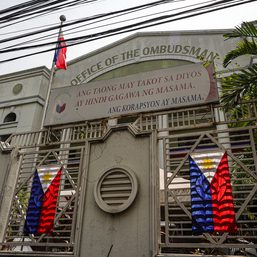SUMMARY
This is AI generated summarization, which may have errors. For context, always refer to the full article.

MANILA, Philippines – Every election season brings with it several reports of poll irregularities, such as how incumbent officials use state resources – funded by taxpayers’ money – to advance their own campaigns.
But an intensive study by poll watchdog Legal Network for Truthful Elections (Lente) from March to June 2022 found that only one in four research participants was able to identify instances of abuse of state resources (ASR) in their respective areas.
“There’s really a vacuum or lack of knowledge about the prevalence of this problem and how it affects electoral integrity,” Lente executive director Ona Caritos said in a press conference on Wednesday, October 26.
Wednesday’s conference listed the different ways government resources can be exploited by people in power during elections.
1. Use of government vehicles for campaigns
During the campaign season, government vehicles were being used to distribute campaign materials and food, as well as transport sortie attendees.
But Marisse Aldeza, Lente’s ASR monitoring project director, said the lack of an identifier in some government vehicles hampered the ability of respondents to assess whether what they observed falls under abuse of state resources.
“Apparently, some said they can’t say for sure if it’s a government vehicle because it’s not marked by the LGU, or it’s not red-plated, so they cannot ascertain whether it’s a government vehicle,” she said.
2. Use of government structures
Respondents also identified barangay halls and covered courts as among structures commonly used by politicians in power for their campaigns, according to Lente.
“[They] are used for campaign materials storage which include food and beverage for supporters, tarpaulins, and posters,” Aldeza said.
3. Campaigning in the guise of ‘ayuda’ distribution
Lente also noted that there were instances when incumbent officials took advantage of state-sponsored financial aid distribution to promote themselves.
“Unfortunately, people had a hard time identifying instances of abuse of state resources for election purposes, and differentiating between legitimate social services and ASR by incumbent officials,” Aldeza explained.
After the 2022 elections, the Commission on Elections (Comelec) started going after politicians supposedly liable for the illegal release of public funds, such as Albay Governor Noel Rosal and Legazpi City Mayor Geraldine Rosal. They were disqualified at the division level, but a final and executory decision remains pending before the Comelec en banc.
“Lente strongly urges the Comelec to issue stricter guidelines, in so far as prohibiting the presence of any candidate, incumbent or otherwise, in the distribution of social services during the campaign period,” Caritos said.
4. Use of official LGU public information pages to favor candidates
Lente also urged local government units (LGU) to adopt a social media posting policy that will prevent their public information office pages from promoting incumbent officials and their allies.
“The delivery of information [should] not mention the name of the candidate or something similar to that, to avoid the concept of ‘epal’ politics on the online level,” Aldeza said.
5. Hiring job order personnel to help in campaigns
One unexpected discovery of Lente during their research was how local chief executives would exploit the job order system – or the hiring of a worker for a piece of work for a short duration of time – to benefit their campaigns.
“Mayors engage additional job order personnel as early as a year before the elections,” Aldeza explained. “These job order personnel then translate to direct votes and often times function as coordinators for purposes of electoral campaigns,” she added.
“Under our existing law, that’s allowed, as opposed to civil servants engaging in electioneering and partisan political activities, they are prohibited. There’s that distinction, but at the end of the day, they are both being paid out of government funds,” Aldeza said.
What can be done
The election code classifies as an offense the use of a government-owned vehicle for election campaign. As a general rule, it also prohibits civil service employees, policemen, and soldiers from engaging in partisan political activity.
But Lente also recommends amending the law to “establish a mechanism for command responsibility,” as local chief executives or mayors use personnel under a job order contract to abuse state resources in their behalf.
The watchdog said it will be a major undertaking to go after ASR offenders, as a case needs to have a private complainant, and research participants themselves have “no appetite” and are afraid to take matters to court.
Nonetheless, Lente advises concerned citizens who witnessed instances of abuse of government resources to send incident reports via their email lente.philippines@gmail.com. – Rappler.com
Add a comment
How does this make you feel?
![[WATCH] Bamban POGO scandal: There’s a bigger fish than Alice Guo](https://www.rappler.com/tachyon/2024/07/inside-track-tcard-bamban-pogo.jpg?resize=257%2C257&crop=435px%2C0px%2C1080px%2C1080px)



![[OPINION] What kind of citizens are we?](https://www.rappler.com/tachyon/2024/07/tl-what-kind-of-citizen-are-we.jpg?resize=257%2C257&crop=333px%2C0px%2C1080px%2C1080px)
![[Free to Disagree] Boomers, let go please](https://www.rappler.com/tachyon/2024/07/tl-boomers-let-go.jpg?resize=257%2C257&crop=286px%2C0px%2C720px%2C720px)


![[ANALYSIS] The political divorce rocking the Philippines](https://www.rappler.com/tachyon/2024/07/TL-duterte-marcos-china-US-feud-july-4-2024.png?resize=257%2C257&crop=303px%2C0px%2C720px%2C720px)

There are no comments yet. Add your comment to start the conversation.